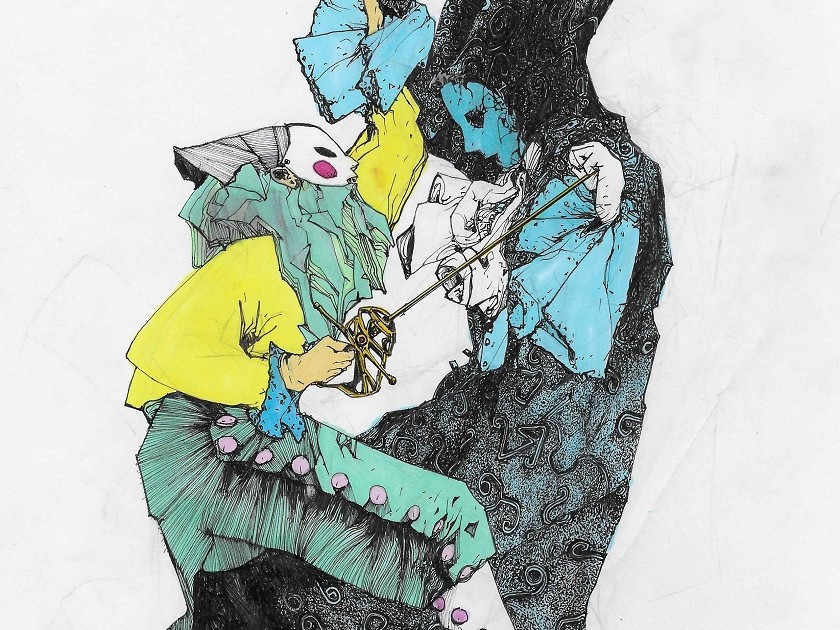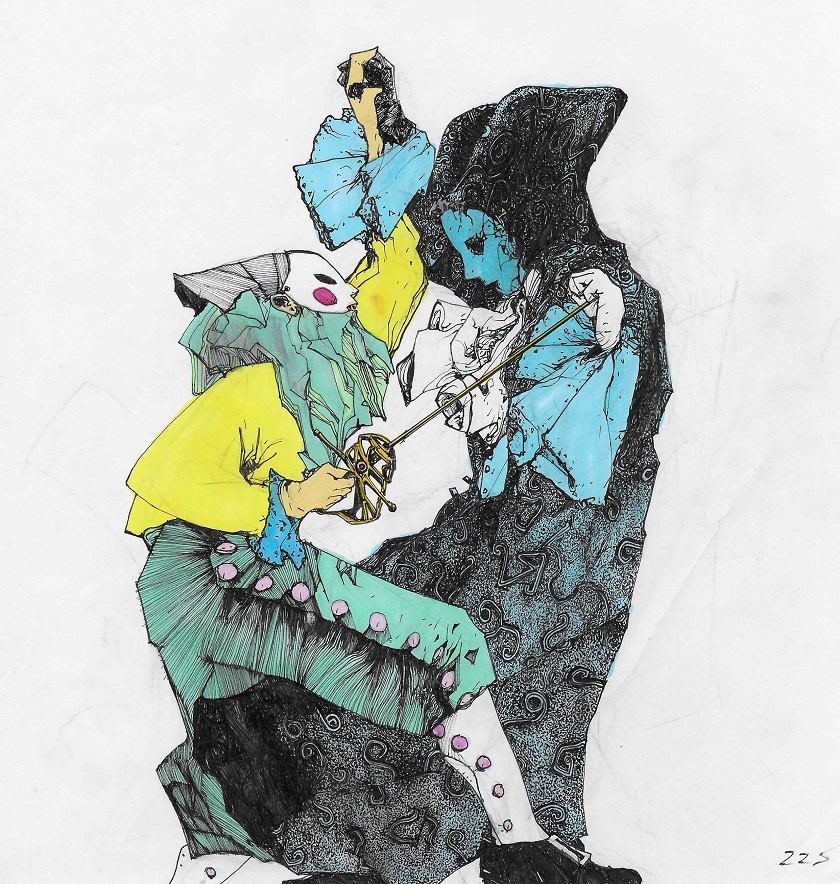
Cropped Don Giovanni. Image courtesy of author
Lorenzo Da Ponte is the single most important Jew in the history of opera, yet few people know the name of the writer who made it possible for Mozart to be revered today as the greatest opera composer of all time. Without Da Ponte’s contributions as libretti — that is to say, the story and words — Mozart would have never been able to compose the three musical scores “Don Giovanni,” “The Marriage of Figaro,” or “Cosi Fan Tutte,” that led to his eternal fame.
Nonetheless, for all Da Ponte’s brilliance in creating these works and his efforts to bring opera to early modern New York City, he was derogatorily referred to as “Mozart’s Jewish Priest” behind his back.
Who was Lorenzo Da Ponte?
My latest novel, Meeting Mozart: From the Secret Diaries of Lorenzo Da Ponte, explores who exactly Da Ponte was and how his modern-day descendants endured the antisemitism of Europe, nineteenth century New York City, and the Holocaust.
Da Ponte was born Emanuele Conegliano in 1749, into working class poverty in the Jewish ghetto of the village of Ceneda; Ceneda was in the Veneto, located not far from Venice. Da Ponte was a gifted polymath, and, being unable to afford a formal education, he was entirely self-taught. Consequently, he was known as the Spiritoso ignorante — the ignorant genius.
A year after Da Ponte’s bar mitzvah at age thirteen his father, a widower, married a Catholic woman. In order to do so, his father had to convert the entire family. This transformation from Jew to Catholic had severe consequences for Da Ponte and his younger brothers. In an instant, Da Ponte was torn away from his Jewish community and his friends, who remained behind in the ghetto. Like all such Conversos, Da Ponte was forbidden to have any contact whatsoever with any Jew — on the penalty of death, imprisonment, or a life of servitude in the galleys of the Venetian Navy.
Da Ponte tried to make the best of a horrible situation, a survivalist trait that would serve him well throughout his life. He took the name of the bishop doing the conversion and thus became Lorenzo Da Ponte. Desirous of an education, Lorenzo convinced the bishop to allow him to attend school at a seminary. He did not understand that becoming a priest was the end route of his studies there. Lorenzo initially accepted this bargain to gain the education he sought after.
Da Ponte was assigned as an abbé at the Church of San Luca in Venice after he finished his studies. Despite his great intellect and writing abilities, he was uninterested in Church doctrine and made for an uncommitted priest. In Venice, he counted the infamous Casanova among his closest friends. And so it came to be that on Sundays Da Ponte would hear confession, but on the other six days of the week, he would gamble, drink, write risqué poetry, and engage in romantic affairs. For a time, he ended up living with Angela Tiepolo — the first of his many mistresses — a married woman from one of the wealthiest families in Venice.
He was ultimately denounced as a Jewish heretic by another lover’s estranged husband and was ordered to stand trial. Casanova, who understood the forces that were being aligned against Da Ponte, urged him to flee Venice rather than risk being tossed into the infamous prison beneath the Bridge of Sighs.
In an instant, Da Ponte was torn away from his Jewish community and his friends, who remained behind in the ghetto. Like all such Conversos, Da Ponte was forbidden to have any contact whatsoever with any Jew.
Once more reinventing himself — this time as a professional writer — Da Ponte turned up in Vienna in 1781, with a letter of introduction to Salieri, the Court Composer for the Hapsburg emperor. He was then hired as the Court Librettist.
Vienna, the Hapsburg’s Imperial Capital, was not particularly welcoming to Jews, and so Da Ponte hid his heritage as best he could behind his priestly façade. Vienna had been the scene of one of the most brutal destructions of the Jewish communities in 1421, during what would be known as the Vienna Gesera; the Hebrew Temple was burnt to the ground and the entire Jewish community that did not flee was massacred. In Da Ponte’s time antisemitism remained rife in Vienna. Through another sympathetic Converso, Baron Raimund Wetzlar von Plankenstern, Da Ponte was introduced to a struggling but brilliant composer desperate to break into the world of opera, Wolfgang Amadé Mozart. The two equally matched geniuses became fast friends.
During this time in Mozart’s career, he was stymied in his struggles to compose an Italian language opera for the Hapsburg Court Theater. Following his move to Vienna, also in 1781, Mozart was considered a brilliant pianist and composer for the keyboard, but few considered him worthy as an opera composer compared to those Italian language composers dominating the stage at that same time such as Salieri, Paisiello and Martin Y Soler. No one wanted to work with him, and that included the Emperor Joseph II — who owned the theater — and his Lord Chamberlain, Count Franz Orsini Rosenberg, who ran the Court Theater.
It has long been a false axiom of the opera world that great operas come about because of the composers who create the music and the singers who bring them to life. It is a convenient fiction and one that has long diminished the work of the writer, the libretto. Without a strong and solid story and lyrics set before them, even the best opera composers would be staring at a blank page.
Mozart finally got his first shot at composing an Italian language opera for the Hapsburgs only after Da Ponte persuaded Emperor Joseph II that his adaptation of a banned French play, “The Marriage of Figaro,” would make a perfect opera. Da Ponte had the foresight to take out all of the offensive political elements. After reading the libretto, the emperor agreed to have the opera staged.
Not only was “Figaro” a grand success, but to this day it is the oldest continuously performed opera in the world and ranks in the top five of most critics’ lists. “Figaro” led to a commission for “Don Giovanni,” also considered one of the great operas of all time; “Don Giovanni’s” success encouraged Joseph II to commission “Cosi Fan Tutte,” an ever popular sexual farce that mimicked not only Da Ponte and Mozart’s actual lives, but that of the Emperor’s as well.

Don Giovanni
However, Da Ponte’s real life escapades — and Jewish heritage — continued to get him into trouble with the Hapsburgs. When Joseph II died and his brother, Leopold, took over the throne, the outspoken Da Ponte found himself in trouble and was once more forced to flee. In 1791 at age forty-two, and after twenty years of philandering, he snuck back into the Veneto and was married to Nancy Grahl, another Converso, by a rabbi. They would remain faithful to each other for the next forty years of their lives.
It was not safe for Da Ponte, a Jewish Converso priest, to remain in the Veneto, and so he and Grahl emigrated, first to London, and then to New York in 1805. Early modern New York was no haven for Jews and so Da Ponte continued his pretense of being Catholic. Ever the survivor, Da Ponte first opened up a dry goods store in New Jersey and then, later, he started an Italian bookstore in lower Manhattan. It was here he met and became friends with Clement Moore, a professor whose father was the Episcopal Bishop of New York and the head of what became Columbia University.
Moore — also the author of “The Night Before Christmas” — introduced the Da Pontes to the elite society of New York City, including James Fenimore Cooper, Washington Irving, Samuel F. B. Morse, Williams Cullen Bryant, Henry Wadsworth Longfellow, and Joseph Bonaparte (Napoleon’s brother, who was then living there in exile).
The Moore’s engaged Da Ponte as the first teacher of Italian at Columbia University. To this day, the Italian Language Library at Columbia is named for Da Ponte.In the 1820’s and 1830’s, with the financial help of his friends, Da Ponte started the first two opera companies in New York City. These theaters paved the way for the most preeminent opera theater in America today, the Metropolitan Opera House.
Inspired by Casanova’s epic autobiography, Da Ponte used his time in New York City to write his own account of his life; however, one volume of this is purported to be missing,the secret diary that is thought to describe his life as a Jewish Converso.
Da Ponte passed away in 1838 at the age of eighty-nine and was buried in a Manhattan Catholic church cemetery. But his grave has disappeared, leaving us to wonder if in fact his coffin was not perhaps reinterred in some Jewish graveyard under the name Emanuele Conegliano.
Howard Jay Smith is the award-winning author of Beethoven In love: Opus 139, and Meeting Mozart: From the Secret Diaries of Lorenzo Da Ponte. Smith serves on the board of directors of the Santa Barbara Symphony and is a member of the American Beethoven Society. He is currently at work on a new novel about Giuseppe Verdi.